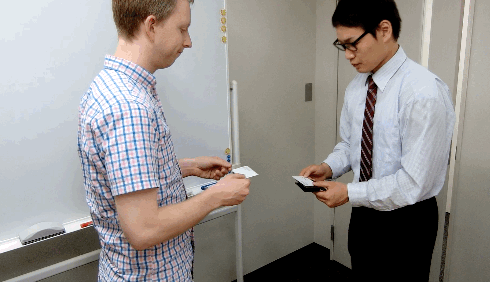Japan is known for its extremely complex rules of etiquette. It may seem unnecessary or time-consuming to turn simple actions into whole ceremonies, but in Japan no one sees this as a hindrance. And here are some rules that might drive you crazy.
Addressing people
In Japan, it is not enough to just address a person by name. The respectful addition '-san' that you may know from pop culture is just the tip of the iceberg, however.
-kun: A less formal honorific than the neutral '-san'. The generalized usage is a proxy for the word 'friend'.
-chan: A diminutive that is mainly used for children, female family members, lovers and close friends.
-self: The most respectful version (sir, honorable). It was used for lords and deities. Today it is sometimes used sarcastically.
-senpai: Addressing older colleagues and classmates.
-kōhai: The opposite of 'senpai.
sensei: Addressing teachers, doctors, scientists, politicians and other government bodies
-shi: Formal record.
In the elevator
The Japanese also have rules for elevators. If you are the first to enter an empty elevator, you become the captain of the elevator, who must stand near the control panel. Your job is to hold the door so everyone can enter. You also have to be the last to leave the elevator, and you have to do it all very quickly.
Exchange of business cards
It's a real ritual. What do you need to do? First, make sure the business card is facing up (front side up). Offer it with both hands. If your position is lower than your partner's position, then drop the business card lower than his. If it's a business card, put it in your business card 'wallet' and take a few seconds to look at it. Don't forget to bow. If you don't have a 'wallet' for business cards, you're screwed.

Metro
There are some strict rules that Japanese people have to follow on the subway: no talking (not even on the phone) and it is impolite to stare at other people. It is not customary to give up your seat to elderly people, even if they can barely stand. There are special seats for them, as well as for the disabled and pregnant women. You may not sit in these seats if you do not fall into these categories.
Alcohol
When the Japanese drink, they forget all hierarchy. The professor can drink with his students, who then drag him home. Officials who kowtow to their partners during the day get drunk in karaoke bars and throw up on their clothes. And this is all normal. Interestingly, sober people will act as if nothing ever happened. So what happens while drinking in Japan stays there.
Touching
In Japan, it is impolite to look people in the eye, let alone touch them. Every Japanese respects each other's personal space. Kissing in public is also not desirable. Before 1945, this was a violation of public order.
Money
The Japanese also have a rather unusual attitude towards money: for some reason they are ashamed to show it in public. That's why various decorated envelopes are popular here. And if you don't have that envelope, you'll have to wrap the money in newsprint. You don't have to do this in supermarkets, but you still have to follow this rule: never put money in the hands of the cashier, put it on the money tray. This is to protect personal space.
Bowing
It is also important that you know the art of bowing, which children learn from a young age. There are several ways to bow: standing, sitting, female and male versions. Here are some of them:
- Greetings (ashaku), 15-degree bow: for people of the same business or social standing.
- Respectful bow (keirei), 30 degree bow: bow for teachers and superiors.
- Deep respect (saikeirei), 45-degree bow: bowing as an apology or bowing to the emperor.
Considered a plea for existence, the bow is only used these days if you've done something really terrible. Foreigners are not expected to bow, but the Japanese will always be happy if you return the bow.

Presents
In Japan, the gift-giving culture is very strong, and each year there are two such occasions: o-chugen (summer) and o-seibo (winter). In many countries around the world, it is customary to open gifts immediately, but in Japan it is a sign of greed and impatience.
The art of sitting correctly
Bringing one leg under your thigh is called seiza and is the way the Japanese sit on the floor. The position is comfortable for them just as it is comfortable for us to sit in an armchair. But since we Europeans are not used to it, our legs quickly become numb. If you are a tourist or an elderly person and stretch your legs, you will be excused. But for the Japanese, it would be really inappropriate.
Departure
In Japan, a customer or business partner is almost a god, and they are treated with incredible respect. When they leave, the entire company follows them to the door or to the elevator, and everyone bows until the door closes. Younger generations consider this a somewhat excessive act and often ignore this ritual.






